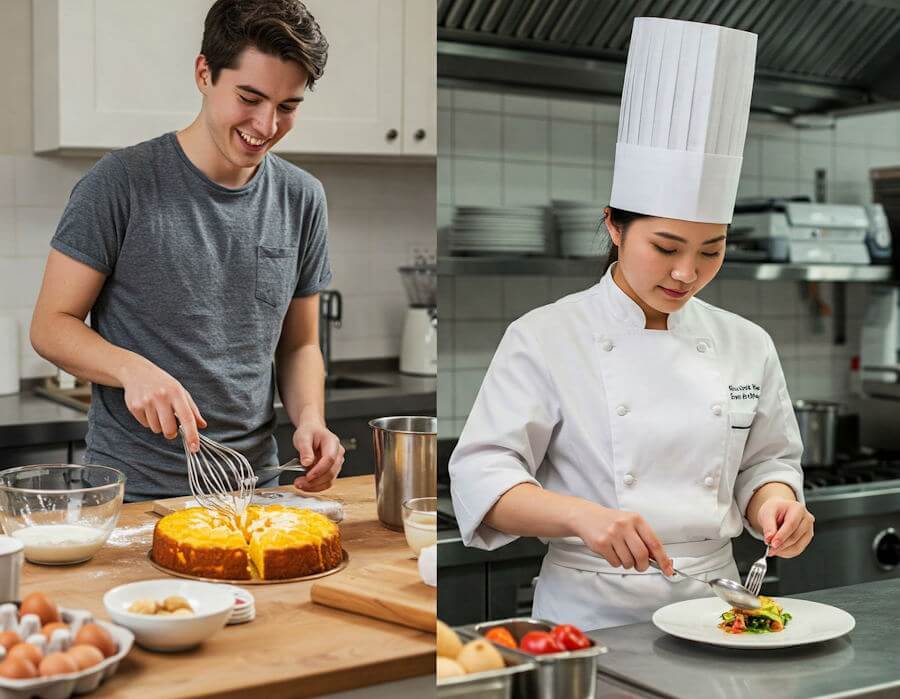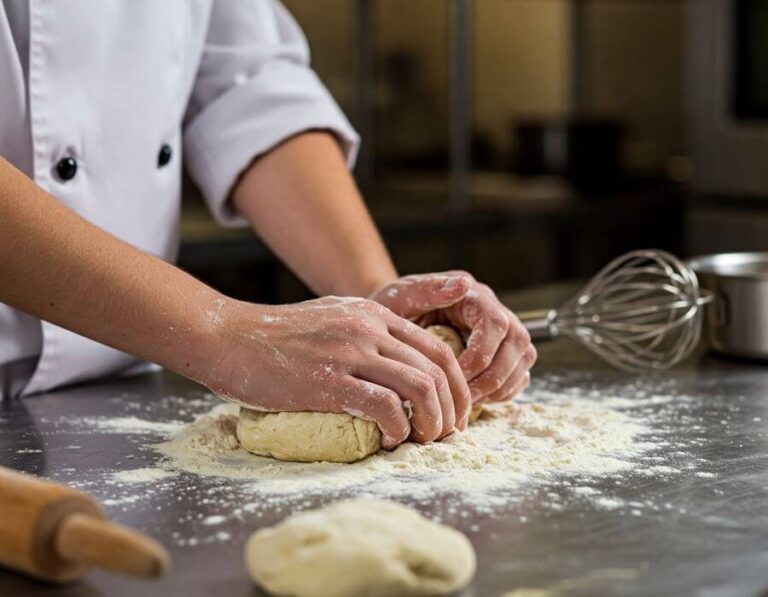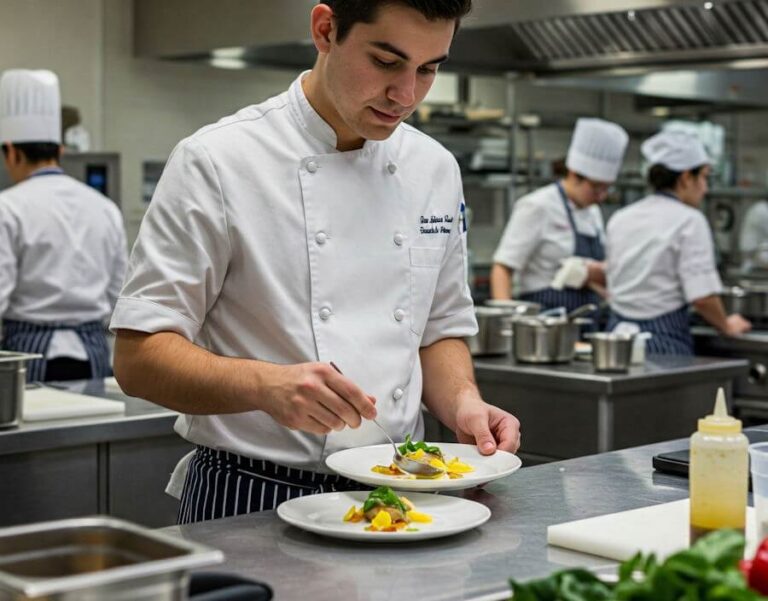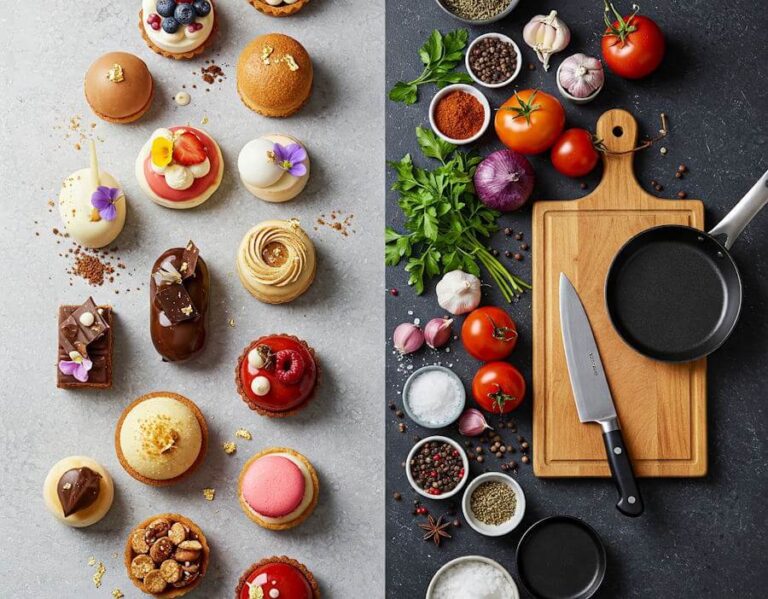The world of culinary arts is a vibrant and dynamic field that encompasses a wide range of activities, skills, and knowledge related to the preparation and presentation of food. This discipline goes beyond mere cooking; it involves the science of food, nutrition, artful plating, and the cultural significance of cuisine. In recent years, culinary arts have gained tremendous popularity, transitioning from a mere hobby for many into a respected profession that contributes significantly to our society.
At its core, culinary arts is an exploration of cooking techniques, ingredient selection, and flavor combinations that delight the palate. It encompasses various cuisines from around the globe, embracing diverse traditions, ingredients, and cooking methods. The increased interest in gourmet food, health-conscious eating, and global culinary trends has led to a growing demand for skilled culinary professionals who can navigate this intricate landscape.
In today’s society, culinary professionals play a vital role in fostering community through food, providing nourishment and comfort, and demonstrating artistry and craftsmanship. As culinary arts continue to evolve, numerous career paths have emerged, ranging from chefs and pastry artists to food stylists, caterers, and culinary instructors. This broad spectrum offers aspiring culinary enthusiasts a variety of options to explore, allowing them to find their niche within the vibrant culinary world.
For many, cooking starts as a simple pastime or hobby; however, transforming this passion into a full-fledged career can be both a fulfilling and feasible pursuit. Culinary schools play a significant role by providing structured training that equips aspiring chefs with essential skills. Through professional education, students can bridge the gap between their personal interests in food and the demands of the culinary industry, ultimately thriving in a field where creativity and skill intersect.
Benefits of Culinary School
Attending culinary school offers numerous advantages that can significantly strengthen one’s career in the culinary arts. A key benefit is the hands-on experience that is integral to culinary education. In a structured environment, aspiring chefs have the opportunity to engage directly in various cooking techniques and methods under the supervision of seasoned professionals. This practical training is crucial, as it enables students to learn not only the fundamentals of cooking but also advanced culinary skills that might be difficult to master without formal guidance.
Moreover, culinary schools provide access to experienced chefs who serve as instructors. These professionals bring a wealth of knowledge and insight from their own extensive careers in the kitchen. Learning from those who have navigated the complexities of the culinary world offers invaluable perspectives that can help aspiring chefs to avoid common pitfalls and make informed decisions throughout their careers. The mentorship provided in this setting fosters a supportive learning environment and encourages students to develop their unique culinary styles guided by seasoned expertise.
Another significant advantage of attending culinary school is the networking opportunities that arise within the industry. Culinary institutions often have established connections with restaurants, catering companies, and food businesses. Students frequently benefit from internships and job placements that allow them to build relationships in the culinary field during their studies. These connections can serve as a vital resource when seeking employment after graduation and can present various job opportunities that may not be available to self-taught cooks.
In addition to practical skills, culinary school students also receive training in essential aspects of running a kitchen, such as food safety, nutrition, and management. This comprehensive approach to culinary education not only enhances cooking proficiency but also prepares graduates for the multifaceted nature of the culinary industry. Ultimately, these benefits position students for a successful transition from passionate hobbyists to skilled culinary professionals.
Identifying Your Culinary Passion
Embarking on a culinary journey often starts with identifying one’s specific interests within the vast and diverse realm of cooking. Understanding your culinary passion plays a pivotal role in optimizing your experience in culinary school. The culinary arts encompass a variety of domains, including pastry, savory cooking, and international cuisine, each with its unique techniques and flavors. This exploration is essential for aspiring chefs who wish to tailor their education to align with their aspirations.
To uncover your culinary passion, it may be beneficial to reflect on your personal experiences in the kitchen. Consider the dishes that excite you, the types of cuisines you enjoy experimenting with, and any dishes that hold sentimental value. Engaging in various cooking activities, such as baking pastries or preparing meals from different cultures, can provide insight into what truly captivates your interest. Additionally, attending cooking classes or workshops can expose you to different techniques and styles, further aiding you in narrowing down your specific culinary focus.
It is also important to recognize that culinary passions can evolve over time. A budding interest in French pastry, for instance, may expand into a fascination with French savory dishes or catering. The beauty of culinary education lies in its adaptability; students are often encouraged to explore various fields before committing to a specific path. Culinary schools typically offer a wide range of programs and courses that allow students to experiment with different cuisines, techniques, and presentations, facilitating this exploration.
Ultimately, understanding your culinary passion not only enhances your culinary school experience but also prepares you for a fulfilling career. Pursuing what inspires you in the kitchen can lead to greater satisfaction and mastery of your craft, paving the way for professional opportunities that resonate with your personal inclinations. As you embark on this journey, carving out a clear culinary passion will undoubtedly enrich both your education and future in the culinary world.
Curriculum Overview
Enrolling in a culinary school provides students with a structured and comprehensive curriculum designed to equip aspiring chefs with the essential skills required in the culinary arts. At the foundation of this curriculum are core courses that develop fundamental competencies crucial for any culinary professional. For instance, knife skills are emphasized heavily; students learn various cutting techniques to prepare food efficiently and safely. Mastering knife skills is vital in fostering both speed and precision in meal preparation.
Another essential area of focus in culinary education is food safety. Understanding food safety practices is critical in preventing foodborne illnesses and ensuring that culinary professionals adhere to health regulations. Students delve into safe food handling, storage, and preparation methods, as well as regulations that govern the food service industry. Additionally, nutrition is a vital component of the curriculum, as chefs must have a comprehensive understanding of dietary needs and healthy cooking practices to serve diverse clientele.
As culinary students progress through their education, they are introduced to specialized subjects that expand their culinary repertoire. Baking and pastry arts, for instance, are often included as elective courses, where students learn techniques for creating breads, pastries, and desserts that meet various standards of excellence. Furthermore, many programs offer classes that explore ethnic cuisines, allowing students to immerse themselves in the diverse traditions and flavors from around the world. This exposure cultivates creativity and adaptability in their cooking styles.
Through a combination of foundational training and specialized subjects, culinary school prepares students to thrive in a competitive food industry. The hands-on experience gained in these courses is invaluable, giving students the confidence to pursue various culinary careers. Ultimately, the curriculum not only imparts technical skills but also fosters a profound appreciation for the culinary arts.
Networking Opportunities
One of the most significant advantages of enrolling in a culinary school is the networking opportunities it provides to aspiring chefs and culinary professionals. The culinary arts field is well-known for its emphasis on relationships, making it vital for students to build a strong network while pursuing their education. Culinary schools often host events, workshops, and seminars, which enable students to engage directly with established chefs and industry leaders. These interactions can create lasting connections that may prove invaluable in the professional realm.
Culinary schools generally have partnerships with restaurants, hotels, and catering companies, offering students a chance to connect with potential employers. Through internships and externships, students can work in real-world environments where they can showcase their skills and passion. Forming relationships with these employers not only enhances professional visibility but can also lead to job offers upon graduation. Knowing someone in the industry who can advocate for one’s skills can significantly increase a graduate’s chances of securing employment in a competitive job market.
Furthermore, fellow students can become invaluable contacts in the culinary industry. Collaborating on projects or working together during intensive training can foster lifelong friendships that extend beyond the classroom, potentially leading to partnerships in future ventures. As the culinary world thrives on collaboration and innovation, having a cohort of peers who share the same passion can inspire new ideas and creative culinary expressions. Attending culinary school thus creates an environment where students can leverage not only the guidance of experienced instructors but also the dynamic energy of their peers. This interconnectedness serves as a foundation for future collaborations and opportunities within the culinary landscape.
Real-World Experience through Internships
One of the key components of a culinary school education is the opportunity for students to engage in internships or externships within the food industry. These hands-on experiences provide invaluable real-world exposure that complements and enhances the academic curriculum. By participating in internships, culinary students can apply the theoretical knowledge they acquire in the classroom to practical situations, thereby facilitating a deeper understanding of the culinary arts.
Internships enable students to work in a variety of settings, such as restaurants, catering companies, hotels, and food production facilities. This diversity allows them to explore different facets of the culinary world and discover their specific interests and strengths. During this immersive learning experience, students can observe and participate in kitchen operations, ranging from meal preparation to customer service, equipping them with a comprehensive skillset that is essential for their career development.
Moreover, gaining real-world experience through internships fosters personal and professional growth. Students learn how to work collaboratively as part of a team, adapt to fast-paced environments, and manage time effectively—skills that are crucial in the culinary industry. The mentorship provided by experienced chefs during these internships acts as a guiding force; students receive constructive feedback and advice that allows them to refine their techniques and improve their competencies.
In addition, internships are a significant asset when it comes to building a professional resume. Employers in the culinary sector often look for candidates who have hands-on experience. By showcasing internships on their resumes, culinary school graduates demonstrate their commitment to the profession and their readiness to tackle real-world challenges. Ultimately, these experiences serve as a bridge between academic learning and the professional culinary landscape, preparing students for successful careers in the culinary arts.
Costs and Investment Considerations
Attending culinary school is often viewed as a significant financial commitment, but it is crucial to analyze this investment beyond the immediate costs. The tuition for culinary programs can vary widely based on factors such as location, type of institution, and program length. On average, students can expect to pay anywhere from $5,000 to $50,000 for their culinary education. This range encompasses both community colleges offering associate degrees and prestigious culinary institutes that grant bachelor’s degrees.
In addition to tuition, prospective culinary students should account for the costs of materials and supplies, which can add several hundred to a few thousand dollars to the total expenditure. Essential items may include textbooks, uniforms, and kitchen tools. Many culinary programs also require students to purchase specific equipment or materials for their courses, which should not be overlooked when budgeting for culinary school.
Beyond these apparent expenses, hidden fees can further increase the financial burden. These can include application fees, laboratory fees for hands-on learning, and equipment maintenance costs. It is advisable for students to conduct thorough research on their chosen schools to gain a comprehensive understanding of the total costs they may incur throughout their studies.
Despite these initial costs, investing in a culinary education can lead to substantial long-term benefits. Graduating from an accredited program can enhance job prospects, open doors to advanced positions in the culinary world, and provide a competitive edge in a fast-growing industry. Culinary graduates often enjoy increased job stability and earning potential, making this educational endeavor a strategic investment in one’s future career. As one weighs the immediate financial implications, the potential for career advancement and personal fulfillment must also be carefully considered.
Success Stories from Culinary Alumni
The culinary world is filled with numerous inspiring stories of individuals who transformed their passion for cooking into successful careers. Graduates from various culinary schools have embarked on remarkable journeys, showcasing the transformational impact of culinary education. One prominent example is Chef Maria Gonzalez, who began as a part-time barista before enrolling in a prestigious culinary program. Through dedication and hard work, she honed her skills, eventually landing a position in a renowned restaurant. Maria’s story is a testament to how culinary schools equip aspiring chefs with the skills necessary to thrive in a competitive industry.
Another notable success story is that of Chef David Chen, who transitioned from a corporate job to pursue his long-standing dream of becoming a chef. Enrolling in a culinary school allowed David to learn not only cooking techniques but also the intricacies of running a kitchen and managing a menu. His time at culinary school provided him with invaluable networking opportunities, ultimately leading him to open his own Asian fusion restaurant, which quickly gained acclaim for its innovative dishes.
These alumni exemplify the diverse paths taken by culinary graduates. From chef instructors to food stylists, many have found their niches and built successful careers in various culinary fields, including catering and food media. Attending culinary school not only offers practical training but also fosters a supportive community where aspiring chefs can share their experiences and passions. Such connections often lead to collaborative ventures and mentoring opportunities that further enhance careers. The journeys of graduates like Maria and David vividly demonstrate how investing in culinary education can open doors and create a pathway to fulfilling and lucrative careers in the culinary arts.
Conclusion: Taking the First Step
As we have explored throughout this blog post, the journey from a culinary hobbyist to a professional chef involves several critical stages, each contributing to the development of essential skills and knowledge. Culinary school offers more than just formal education; it provides an environment that fosters creativity, enhances technical abilities, and exposes students to diverse culinary traditions and methodologies. These experiences are invaluable for individuals aspiring to elevate their passion for cooking into a profession.
One of the primary benefits of enrolling in culinary school is the structured curriculum that addresses various aspects of cooking, from fundamental techniques to advanced culinary arts. Additionally, students have the opportunity to learn from seasoned chefs, whose expertise and mentorship can significantly impact their personal and professional growth. Networking is another critical advantage, as connections made in culinary school can lead to job opportunities and collaborations in the culinary field.
Potential students should also consider the importance of personal and professional development when choosing a culinary school. Researching different programs, visiting campuses, and engaging with current students and faculty can provide insight into which institution best aligns with their educational and career goals. Scholarships and financial aid options may also be available, making culinary education more accessible to aspiring chefs.
In summary, for anyone looking to transform their cooking hobby into a rewarding career, culinary school offers a robust platform for development. With the right guidance and resources, aspiring chefs can cultivate their talents, learn essential skills, and enter a dynamic industry. Taking that first step towards culinary education could ultimately be the catalyst needed to turn a passion for cooking into a fulfilling profession.




